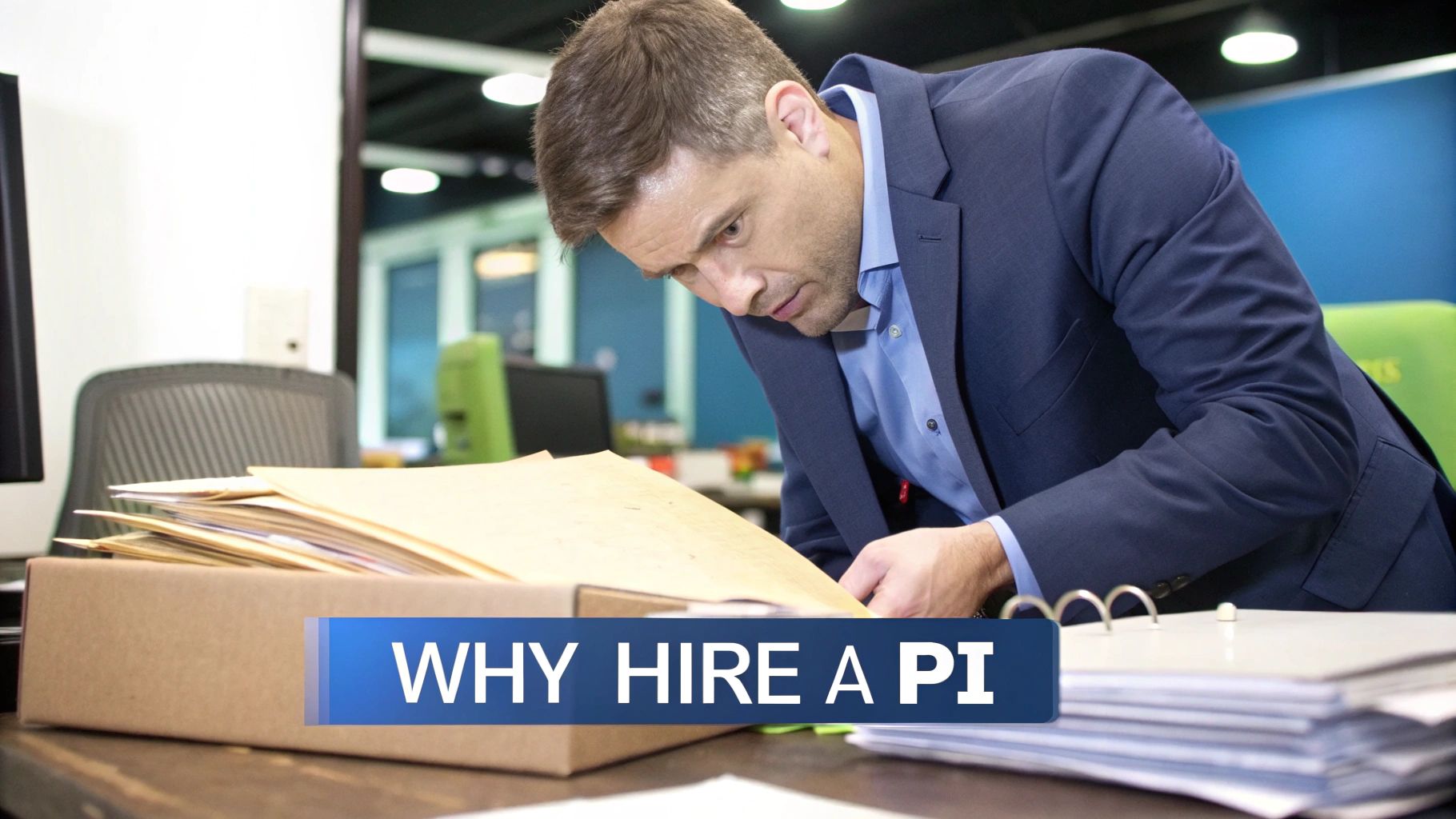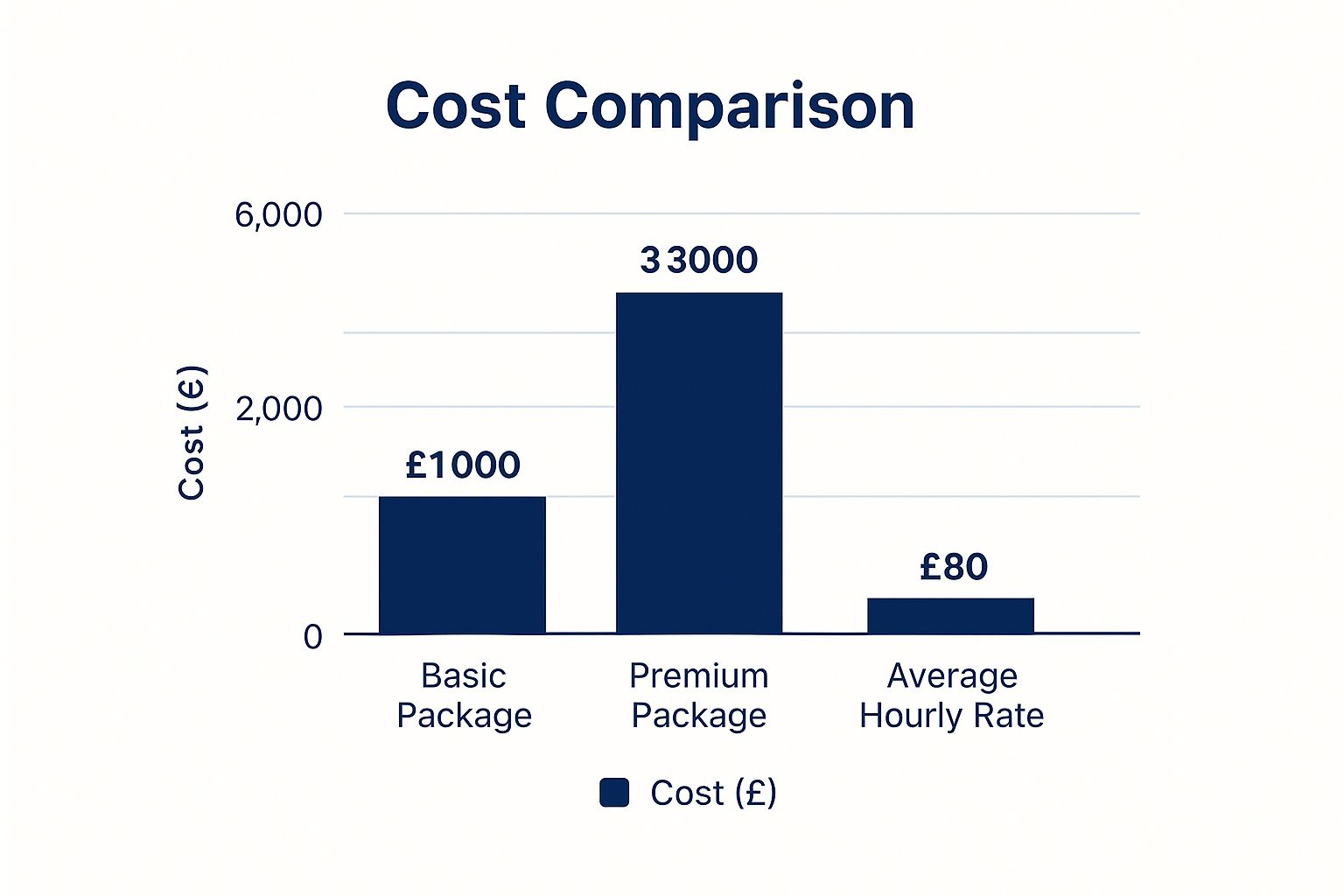Hiring a Private Investigator UK: Your Complete Guide
- Showix technical Team
- Jun 23, 2025
- 18 min read
Updated: Jul 28, 2025
Recognising When You Actually Need Professional Help

It’s a familiar feeling: you're facing a tough personal issue or a tricky business problem, and the thought of playing detective yourself is tempting. Maybe you’re dealing with the gut-wrenching suspicion that your partner is cheating, or perhaps you're trying to figure out why stock keeps vanishing from your warehouse. The urge to handle it personally is strong, often driven by a need for control and the desire to save a bit of money.
But there's a clear line between what you can manage on your own and a situation that really needs a professional. Understanding where that line is can save you a world of emotional grief, wasted time, and even serious legal complications down the road.
Trying to investigate things yourself, especially when emotions are high, can be a recipe for disaster. Attempting to discreetly watch a loved one or confront an employee creates a huge amount of stress. This can easily cloud your judgement, causing you to misread situations or jump to the wrong conclusions. An impartial, professional investigator doesn't have this emotional baggage. They approach the case with total objectivity, focusing purely on gathering the facts.
When DIY Investigations Go Wrong
Taking matters into your own hands can backfire in spectacular fashion. Let's say you decide to follow someone you suspect of wrongdoing. Without proper training in covert surveillance, you’ll probably be spotted. This not only tips them off, giving them a chance to change their behaviour and hide their tracks, but it can also make things much worse. In a worst-case scenario, you could find yourself facing accusations of harassment or stalking, landing you in legal hot water.
Similarly, a business owner who suspects an employee is faking a workplace injury might be tempted to sift through their social media. While it sounds simple enough, collecting evidence that will hold up in a tribunal is a very specific skill. A professional investigator knows the rules of evidence inside and out, ensuring everything they gather is obtained legally, ethically, and in a way that’s admissible in court. They know how to document their findings to provide solid proof, not just raise more suspicions. The rise in people hiring a private investigator UK-wide is a direct result of these kinds of complexities.
The private investigation industry in the UK has grown significantly, fuelled by increasingly complex issues in both our personal and business lives. Modern life has created a bigger need for professional help with things like fraud, infidelity, corporate misconduct, and finding missing people. Corporate investigations, in particular, are booming as businesses turn to experts for sensitive issues like embezzlement, intellectual property theft, and employee wrongdoing. Professionals use advanced tools like digital forensics and social media analysis to gather evidence more effectively.
Key Scenarios Demanding a Professional
Some situations almost always call for an expert. Knowing these triggers is the first step towards getting the right outcome.
Legal Proceedings: If you need evidence for a court case—be it for a divorce, a child custody dispute, or an employment tribunal—any evidence you gather yourself will likely be thrown out. Investigators are skilled at producing court-admissible reports, witness statements, and detailed surveillance logs.
Complex Financial Fraud: Trying to uncover hidden assets or unravel a sophisticated corporate fraud scheme requires specialised financial investigation skills. Professionals have access to databases and resources that the average person simply doesn't.
Missing Persons: Finding someone who has disappeared, like a debtor who has gone to ground or an estranged family member, is incredibly challenging. It requires access to specific databases and a wide network of contacts.
Technical Surveillance (Bug Sweeps): If you're worried your home, office, or car might be bugged, you need a Technical Surveillance Counter-Measures (TSCM) expert. Only they have the specialist equipment and expertise to conduct a proper sweep and find any listening devices.
When the stakes are high and the truth feels just out of reach, hiring a private investigator in the UK isn't giving up—it's making a smart, strategic move to get back in control.
Understanding the UK Investigation Industry Landscape

Before you start the search to hire a private investigator in the UK, it helps to get a feel for the industry itself. It’s a world that might not be what you expect, especially if your only reference is what you’ve seen on TV. The most critical point to understand is that the private investigation sector in the UK is currently unregulated. This means there’s no government-issued licence, no official exams to pass, and no legally required qualifications to call yourself a private investigator.
This lack of regulation has created a real mixed bag of a marketplace. You'll find highly skilled professionals—many with backgrounds as police officers, military intelligence personnel, or legal experts—who approach their work with a strong ethical code and years of experience. On the flip side, there are people with very little training, who may use questionable methods and have little more than an impressive-looking website. This means the responsibility of checking credentials and experience falls entirely on you. Your ability to spot the difference will directly impact the success of your case.
Despite being unregulated, the private investigation industry is surprisingly large. As of 2024, there are about 1,302 investigation businesses operating throughout the United Kingdom. While the market saw a slight dip between 2019 and 2024, it’s projected to reach an estimated £191.5 million by 2025, proving a consistent demand for these specialised skills. You can dig into these trends by checking out the full report on the UK investigation services market.
Agency vs. Solo Practitioner: What’s the Difference?
As you begin looking, you'll mainly find two types of setups: established agencies and solo practitioners. One isn't automatically better than the other; they just cater to different kinds of needs.
Established Agencies: These are bigger companies with a whole team of investigators. They usually have support staff, cover a wider geographical area, and can manage several complex cases at once. An agency is a solid choice if your situation requires multiple skills (like surveillance and digital forensics) or needs to be carried out in different locations. They tend to have more resources and a built-in support network.
Solo Practitioners: These are independent investigators who often specialise in a specific area, such as matrimonial surveillance or finding missing people. The experience can feel more personal, as you'll probably communicate directly with the person handling your case from start to finish. This direct contact can be a big advantage, but it's important to make sure they have the resources and network to meet your specific requirements.
Regional Differences in Cost and Culture
Where you are in the UK makes a real difference, especially when it comes to cost. It’s no surprise that hiring a private investigator in London will almost always cost more than in Manchester, Birmingham, or other cities. This is simply down to higher running costs in the capital, from wages and office rent to the general cost of living.
But does a London price tag mean you're getting a better service? Not always. While London is a major centre for high-stakes corporate and legal work, you'll find brilliant, highly skilled investigators all over the country. A professional based in the Midlands or the North could offer the exact same level of expertise and get you the same results for a much lower fee. The trick is to focus on their experience, credentials, and what past clients say, rather than assuming a London postcode equals top quality. Your goal is to find the best investigator for *your* case, not just the priciest one. Getting to grips with this landscape is the first step toward making a smart decision.
Finding and Evaluating Quality Investigators

Once you've decided professional help is the way forward, the next hurdle is finding the right professional. With the market being unregulated, a quick online search for "hiring a private investigator uk" can feel like a complete lottery. You'll face a wall of websites, all claiming to be the best. The real secret to success is knowing where to look and what to ask, so you can separate the seasoned experts from those who just talk a good game.
Your search should start by looking beyond standard search engines and towards professional networks. Trustworthy investigators are often members of industry bodies like the Association of British Investigators (ABI) or the Institute of Professional Investigators (IPI). These organisations aren't just for show; they enforce strict codes of conduct, require members to hold professional indemnity insurance, and often check their members' credentials and criminal records. An investigator's affiliation with one of these groups is a strong signal of their commitment to ethical and professional standards, and one of the first things you should look for.
The UK's private investigation scene is quite crowded, with an estimated 10,000 to 15,000 active investigators. This large number stems from the lack of a single licensing system, which allows many self-employed individuals and agencies to operate. A good portion, around 3,000, are based in London, where demand for corporate and complex legal work is highest. To get a better sense of how investigators are distributed across the country, you can explore discussions on private investigator forums.
The Initial Consultation: Asking the Right Questions
Think of the initial consultation as your interview with them. This is your chance to get a feel for their professionalism, experience, and whether they're the right fit for your specific situation. Don't bother with vague questions like "Are you good at your job?" Instead, dig into the specifics that reveal their actual competence.
Here are some insightful questions to steer the conversation:
"Can you describe a similar case you've handled, without breaking confidentiality?" A true professional can talk about their process and challenges from past cases in general terms. If they're vague or make it sound too simple, they might be stretching the truth about their experience.
"What are the potential legal and ethical challenges in a case like mine?" This question tests their legal knowledge. A good investigator will immediately bring up things like GDPR, the Human Rights Act, and why it's vital to avoid trespassing.
"What information will you need from me to begin?" Their answer reveals how organised they are. They should ask for specific details and explain why each piece of information is crucial for the investigation.
"How will you keep me updated, and how often?" This establishes clear communication expectations from the start. A professional will have a standard procedure for progress reports and be upfront about how and when they'll contact you.
Spotting Red Flags and Evaluating Credentials
During these conversations, stay alert for any warning signs. A major red flag is anyone who guarantees a particular outcome. No ethical investigator can promise results; they can only follow the evidence wherever it leads. You should also be cautious of anyone who seems a bit too keen to use legally dubious methods, like hacking phones or accessing bank records, which are illegal in the UK.
When it comes to credentials, practical experience often speaks louder than qualifications on paper. While a background in law enforcement or military intelligence is a positive sign, it’s their recent, relevant experience that truly matters. Ask about their specialisms. Someone who is an expert in corporate fraud might not be the best person for a matrimonial surveillance case.
Checking references in this line of work is tricky because of client confidentiality. However, you can ask if they can provide a reference from a solicitor or a corporate client they've worked with. Legal professionals can often vouch for an investigator's work ethic and reliability without spilling case details. For those searching specifically in the capital, we have a helpful guide on how to find the right private investigator in London, UK that provides more region-specific tips. By taking this thorough approach, you go from simply hoping you’ve found a good PI to knowing you’ve hired a true professional.
Decoding Investigation Costs and Payment Models
Trying to figure out the cost of hiring a private investigator in the UK can feel a bit like aiming at a moving target. Prices aren't standardised across the board, and what you’ll actually pay depends on a handful of factors, some of which might not be immediately obvious. The good news is, once you understand the different payment models and potential extra fees, you can set a realistic budget and avoid any nasty surprises later on.
The most common way investigators charge is by the hour. This rate can swing quite a bit based on how complex the case is, the investigator's experience, and where they're based. For example, you might find that an investigator in Manchester or Birmingham has all the skills of a London-based counterpart but charges a lower hourly rate, simply because their business overheads are lower.
Hourly Rates vs. Fixed-Fee Packages
While billing by the hour is standard for ongoing tasks like surveillance, some jobs work better with a fixed-fee arrangement. This is where you agree on a set price for a very specific service, like a basic background check or finding a missing person who is known to be in the UK. A fixed fee gives you certainty on the final cost, which is a huge relief when you’re already dealing with a stressful situation.
For more unpredictable investigations, an hourly rate is often the only way to go. A surveillance job, for instance, is impossible to predict. It could wrap up in a few hours, or it might take several days to gather the evidence you need. In these scenarios, you'll usually pay an upfront retainer, which is an advance payment that the investigator then bills their time against.
To give you a clearer idea, this chart shows some typical pricing structures you're likely to come across.

As you can see, while packages offer a set cost, the average hourly rate provides the flexibility needed for jobs where the timeframe is unknown.
Before we move on, let's look at how these costs can vary across the country. Prices in London are naturally higher, but you'll see different rates in other major cities too. This table breaks down some typical costs you might expect.
UK Private Investigator Pricing Comparison by Region and Service Type
Comparison of typical hourly rates and service costs across major UK cities for different types of investigations
Region | Surveillance (per hour) | Background Checks | Corporate Investigation | Additional Costs |
|---|---|---|---|---|
London | £75 - £120+ | From £250 | £100 - £200+ per hour | Higher mileage/travel fees |
Manchester | £55 - £85 | From £180 | £80 - £150 per hour | Standard rates apply |
Birmingham | £50 - £80 | From £175 | £75 - £140 per hour | Standard rates apply |
Edinburgh | £60 - £90 | From £200 | £85 - £160 per hour | Can include travel to remote areas |
Bristol | £50 - £75 | From £170 | £70 - £130 per hour | Standard rates apply |
This comparison shows that location is a major factor in pricing. An investigator in Bristol might offer similar services to one in London but at a significantly lower hourly rate due to different operating costs.
The Hidden Costs That Can Inflate Your Bill
The final invoice is rarely just the hourly rate multiplied by the hours worked. Anyone who has hired a PI before knows to ask about additional expenses upfront, as these can quickly add up. Make sure you get clarity on these potential charges before you agree to anything:
Mileage: If the job involves following someone, you’ll be covering the fuel. A typical rate is around 45p to 65p per mile.
Travel Time: PIs may charge for the time it takes them to get to and from the investigation location.
Report Writing: Pulling together evidence, writing a detailed report, and getting it ready for potential legal use all takes time, and this is usually billable.
Equipment Fees: Specialised tasks like a 'bug sweep' for listening devices require expensive gear, and you may see a fee for its use on your bill.
Miscellaneous Expenses: This is a catch-all for things like parking, public transport tickets, or even entry fees to events if it's necessary for the case.
A reputable investigator will be completely open about these costs from the start. They should provide you with a clear fee structure and a detailed contract that outlines every potential charge. This level of transparency is a great sign that you’re dealing with a true professional. For a more detailed look at the numbers, you might find our guide on what a private investigator costs and the key factors involved helpful. By asking the right questions, you can ensure you’re making a smart financial choice.
Navigating Legal Requirements and Client Rights
When you're looking to hire a private investigator anywhere in the UK, it’s easy to get focused on the end goal and forget about the legal side of things. But ignoring the laws that govern a PI’s work is a huge mistake. What an investigator can and can't do legally directly affects your case, your investment, and whether the evidence they gather will even be useful. Honestly, thanks to films and TV shows, many people think PIs have almost magical powers. The reality is, they're bound by the same laws as everyone else.
Understanding this from the very beginning is vital. A professional PI’s real value isn't in their ability to bend the rules, but in their expertise at working effectively within them. They know that illegally obtained evidence, like trespassing on private property or using tricks to get information, is not only unethical but will be dismissed in any formal proceeding, making it completely worthless.
The Real Powers of a Private Investigator
Let's get a few things straight. Private investigators in the UK cannot legally hack into phones, access your bank accounts, or get hold of confidential records like medical files or phone bills without proper consent. They don't have a backdoor into police databases or automatic number plate recognition (ANPR) systems. If an investigator claims they can do these things, they are either lying or operating illegally, which puts you in a very risky position.
A reputable investigator’s skill is in gathering intelligence through legitimate methods. This typically involves:
Covert Surveillance: Following someone in public places and documenting what they do with photos or videos. This is completely legal as long as it doesn’t become harassment or intrude on a person’s reasonable expectation of privacy (like filming them through their living room window).
Open-Source Intelligence (OSINT): Digging through publicly available information—social media, public records, and other online data—to build a clear picture of a person's life or connections.
Database Searches: Using specialised, professional-grade databases (which are not the restricted government ones) to trace people or uncover background details.
Human Intelligence: Making discreet enquiries and speaking with individuals who might hold relevant information.
This whole process is tightly regulated, mainly by the General Data Protection Regulation (GDPR) and the Human Rights Act 1998. A professional PI must be able to justify their actions, proving their methods are necessary and proportionate to the investigation, while always respecting a person's right to privacy. It's a tricky balancing act that skilled investigators handle every day. For a more detailed look at the rules, our post on whether private investigators are legal in the UK provides more clarity.
Making Sure Your Evidence Counts
Just because evidence is gathered legally doesn't mean it will be effective. For any evidence to hold up in court or a tribunal, it must meet high standards for quality and integrity. For instance, just showing a photo of a person at a certain place might not be enough. A judge will want to know, "How can you prove when this was taken?"
This is where professional documentation is crucial. An experienced investigator won’t just hand you a few photos; they’ll provide a full evidence package. This usually includes:
Contemporaneous Logs: A detailed, time-stamped log of every observation, recorded as it happens.
Unaltered Image Files: The original digital files, complete with metadata that shows the time, date, and sometimes the location where a photo was taken.
Witness Statement: A formal statement from the investigator, confirming they are prepared to attend court and give evidence under oath.
This level of detail is what transforms simple information into solid, persuasive evidence.
To help you understand the key legal boundaries, we've put together a table outlining some common activities and their legal standing in the UK.
Legal Do's and Don'ts for UK Private Investigations
Essential legal boundaries and compliance requirements for private investigation activities in the UK
Activity | Legal Status | Requirements | Potential Consequences |
|---|---|---|---|
GPS Vehicle Tracking | Legally Complex | Permissible if you own the vehicle. Placing a tracker on someone else's car without consent can be illegal and viewed as harassment. | Civil claims for damages, criminal charges for harassment. |
Surveillance in Public | Legal | Must not constitute harassment or violate a person's reasonable expectation of privacy. Surveillance must be proportionate. | Evidence deemed inadmissible, potential civil action or harassment charges. |
Entering Private Property | Illegal | Requires explicit permission from the property owner. No exceptions. | Criminal charges for trespassing, any evidence obtained is immediately void. |
Recording Conversations | Legally Complex | You can legally record a conversation you are a part of. Recording a private conversation between other people is generally illegal. | Evidence is typically inadmissible in court; risk of criminal charges. |
By keeping these legal realities in mind, you're in a much better position to work with your investigator. This collaboration ensures your case is handled professionally, ethically, and in a way that gives you valuable, admissible evidence you can actually use.
Collaborating Effectively Throughout the Investigation
So, you’ve hired a private investigator. You might think your part is done, but that’s not quite right. The initial briefing is just the start. How you work with your investigator from this point on can be the difference between a decent result and a fantastic one. It’s a bit of a balancing act, though. You need to be helpful without getting under their feet, and stay in the loop without micromanaging the expert you've just employed.
Think of it as a partnership. They have the professional skills and legal knowledge, but you hold the personal insights and background information that no one else has. The trick is to share the right information at the right time. Bombarding them with every minor suspicion or random thought can send them on a wild goose chase. On the other hand, holding back a detail because it seems trivial could be a massive misstep.
Providing Quality Information vs. Information Overload
Your most important role now is to act as a source of high-quality intelligence. A good PI will ask plenty of questions at the start, but new details can pop up as things unfold. It’s common for a client to suddenly remember something important days after the first meeting.
Be Specific: Don't just say, "they drive a blue car." Instead, try to provide the make, model, registration number, and any unique marks, like a dent in the rear bumper or a specific sticker on the window.
Context is King: If you hand over a photograph, explain when and where it was taken and why you think it matters. A photo of the person you're investigating with someone you don't recognise is far more useful if you can say, "This was taken last Tuesday outside their gym, and I have no idea who that other person is."
Stick to Facts: Do your best to separate what you know for sure from what you merely suspect. It’s okay to share your theories, but label them as such. For instance, "I know for a fact he was at The Red Lion on Friday night because his card statement shows it. I suspect he was meeting someone there."
Giving this level of detail helps your investigator plan their time and resources much more efficiently, which ultimately saves you time and money.
Interpreting Reports and Managing Expectations
A professional investigator will give you regular updates. These could be brief emails, phone calls, or more detailed written reports complete with photos and activity logs. When an update arrives, it’s easy to feel anxious, especially if there's "no news." But remember, some tasks, like surveillance, involve long stretches of waiting. No activity is still a result—it helps to rule out a particular location or time.
When you get a report, try to ask helpful questions. Rather than a blunt "Did you find anything yet?", which can sound impatient, ask something more constructive. For example, "Given there was no movement at their office, do you think we should focus on their weekend routine instead?" This shows you're engaged in the process and thinking strategically.
It's also crucial to manage your own emotions. Waiting for answers is incredibly stressful. You have to trust the process and the professional you’ve hired. Calling them constantly for updates can disrupt their fieldwork. It’s much better to agree on a communication schedule from the beginning and stick to it. This respects their professional time and lets them work without interruption, which will get you the answers you need more quickly.
Maximising Value From Investigation Results
The investigation is complete, and the final report is in your hands. This is the moment you've been building up to, but the journey isn't quite over. The real value of an investigation comes from what you do with the information you’ve gathered. Many people overlook this final step, failing to get the most out of their findings. It’s about knowing how to read the evidence, who to share it with, and how to make confident choices based on what’s been discovered.
First things first, take a close look at the report itself. A glossy folder with a few blurry photos just won't cut it. A professional report must contain substantive, actionable evidence. This means detailed, time-stamped logs of all surveillance activities, clear, high-resolution images or video footage, and a well-written summary of events. Your investigator should also be prepared to provide a formal witness statement, confirming they can testify in court if it comes to that. This level of professional documentation is what separates flimsy claims from solid proof that can hold up under legal scrutiny.
Strategic Use of Your Findings
Once you feel confident in the quality of the report, you need to decide who gets to see it. This isn't a decision to be taken lightly, especially when dealing with sensitive personal or business matters.
Legal Counsel: If your situation could end up in court—whether it's a divorce, an employment dispute, or a corporate fraud case—your solicitor should be your first port of call. They can assess the strength of the evidence and advise on the best legal path forward.
Business Partners: In a corporate scenario, you might need to present the findings to other directors or the HR department. To make an impact, you need to be clear and direct. A well-organised report is crucial here. Knowing how to write good summaries can help you communicate the main points effectively without drowning your colleagues in raw data.
Family Members: For personal issues like suspected infidelity, deciding who to tell is a deeply personal choice. You need to think about the emotional fallout and whether sharing the details will ultimately help you or just create more pain.
Moving Forward with Confidence
Not every investigation uncovers the dramatic proof you might have been expecting. Sometimes, the results are inconclusive, or they might even show that your suspicions were off the mark. While that can feel anticlimactic after investing time, money, and emotional energy, it's still a valuable result. It gives you peace of mind and allows you to finally close a chapter of doubt and worry. The entire point of hiring a private investigator UK-wide is to find the truth, whatever it turns out to be. A thorough investigation provides the clarity you need to move on, whether that means taking decisive action or simply letting go of your anxieties.
If you’re facing a situation that requires clear, undeniable answers, our team of discreet professionals is here to help. At Sentry Private Investigators, we provide legally compliant evidence to support you in both personal and corporate matters. Contact us today for a confidential consultation and let us help you find the truth.





Comments